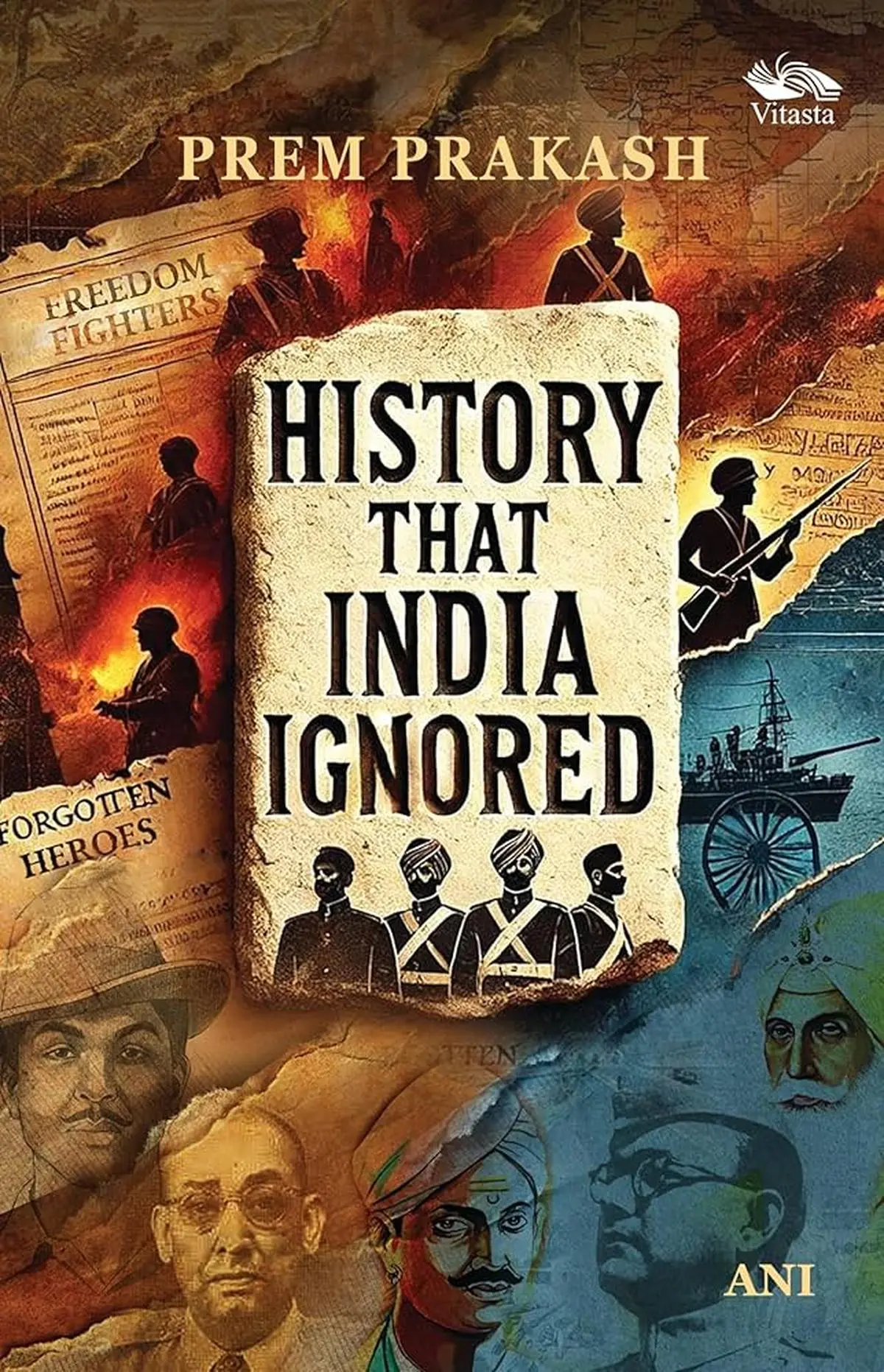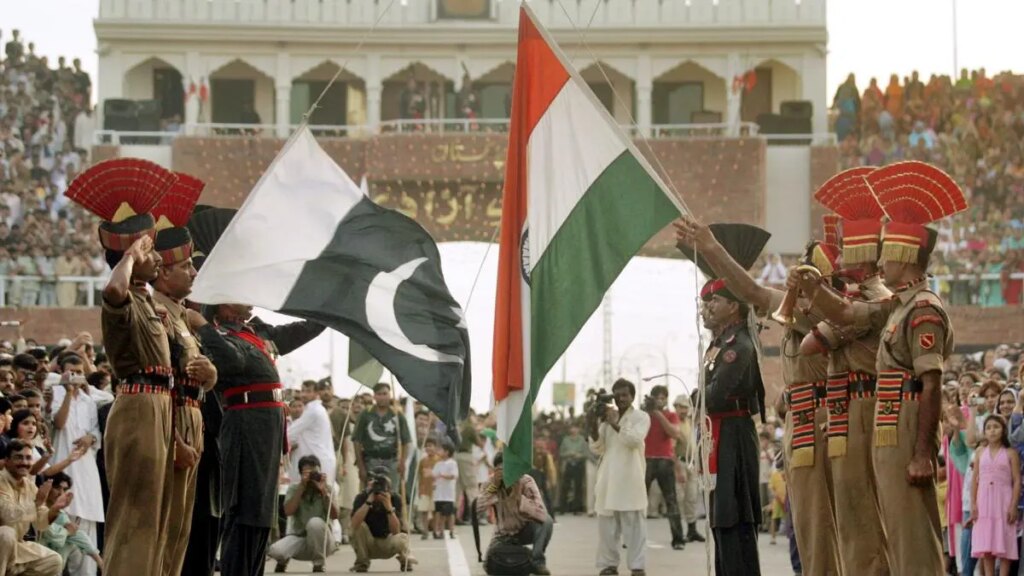
Pakistani soldiers and Indian soldiers lower their respective countries’ flags during the Beating the Retreat ceremony between the two nations, at Wagah, the joint India-Pakistan border post, in 2006.
| Photo Credit: AMAN SHARMA/AP
Prem Prakash argues that Great Britain and the US supported the creation of Pakistan to counter Soviet influence during early Cold War tensions.
In his new book, History That India Ignored, Prem Prakash, born in 1931, concludes that the outgoing Imperial power, Great Britain, deliberately supported the creation of Pakistan because it was needed by the West in the Cold War against the Soviet Union that had begun soon after the end of the Second World War. “India’s leadership was considered to be left-leaning and could not be relied upon. This was something that Jinnah had succeeded in convincing both the British and the Americans, while the Congress leaders were jailed after August 1942. Pakistan was to be a frontline state to stop the movement of the Soviet Union towards the warm waters of the Arabian sea.” According to Prakash, the Congress leadership led by Jawaharlal Nehru did not realise in 1946 that the Cold War had already begun.
Mohammad Ali Jinnah, in Prakash’s assessment, had managed to convince the British and the Americans that he alone was their friend in the subcontinent, while the Hindu Congress was left-oriented. It is a matter of record that Jinnah was not jailed or imprisoned even for a single day throughout the freedom struggle.
Thus, for the British and the West, in 1946, Jinnah was the voice of the Muslims of India. They ignored all other Muslim voices that actually represented the majority of Muslims living in India in 1946. And there were reasons for such an attitude by the British not known to the people of India. Prakash draws on Khan Wali Khan’s book, Facts are Facts (Khan Wali Khan was the son of “Frontier Gandhi” Khan Abdul Ghaffar Khan), and the autobiography of Maulana Abul Kalam Azad titled India Wins Freedom. Azad substantiated the claim that Pakistan was created by the British as a frontline state to counter the Soviet Union or as a country to serve US and European interests.
Also Read | Aditya Mukherjee’s forensic defence of the Nehruvian ‘Idea of India’
Giving the sequence of events after the Second World War, Prakash provides a graphic account of how British Viceroy Lord Archibald Wavell prevailed upon the Muslim League to give the interim government a chance. Muslim League representatives joined the government on October 26, 1946. Jawaharlal Nehru continued as the Prime Minister. Many reasons have been given, but the primary reason for the Muslim League joining the interim government was not to lose the sympathy of the British government, but to assure them of their loyalty. “It all looked good at that moment because the interim government was to take charge of the country,” writes Prakash. However, the attraction and goodness of Independence didn’t seem to inspire the political class to forge unity among themselves. The Muslim League Ministers didn’t see eye-to-eye with the Congress Ministers, with the result that the interim government was far from a cohesive team.
History That India Ignored
By Prem Prakash
Vitasta Publishing
Pages: 280
Price: Rs.695
With a tinge of sadness and anger, Prakash goes on to write: “We all who were living then saw and know what happened when the two countries emerged as a result of Partition on religious basis. History had never seen such a massive movement of mankind. No one is able to give figures of the numbers killed that run into some estimated five million.”
‘Army with a country’
Following Independence, Khan Wali Khan conducted thorough research of the British Government papers in London, including those that he could access from the British Foreign Office. He was confident that there was something not known to the Indian leadership that led the British to hurry through the Partition of India. After studying the papers and speaking with many British politicians, he wrote the eye-opening book Facts are Facts. In this book, he presents his analysis of why the UK, a staunch ally of America, was keen on the creation of a sovereign Pakistan in North India.

In his new book, History That India Ignored, Prem Prakash, born in 1931, concludes that the outgoing Imperial power, Great Britain, deliberately supported the creation of Pakistan because it was needed by the West in the Cold War against the Soviet Union that had begun soon after the end of the Second World War.
| Photo Credit:
By Special Arrangement
Prakash, who had been a frequent traveller to Pakistan, said he heard a joke in the streets of Pakistan that usually countries have armies but here [in Pakistan] the army has a country.
Pakistan was quick to join the grouping of Western nations led by the United States against the Soviet Union. The country became a member of the South-East Asia Treaty Organisation (SEATO). It was not long before America set up a secret air base in Peshawar from where US spy U2 planes used to take off to see what the Soviet Union was doing in the field of nuclear development or space research. These planes could fly at a height where Soviet missiles could not hit them. It did not take long for the Soviet Union to develop a missile that hit a U2 plane and its pilot, Gary Powers, who ejected but was arrested by the Soviet Union.
Also Read | The desi hands that shaped India’s foreign policy
Pakistan became a frontline state of the western alliance as written by Khan Wali Khan in his book on why India was partitioned. In the proxy war that the U.S. and its allies, Pakistan and Saudi Arabia, fought against the Soviet Union in Afghanistan from the end of 1979, Pakistan’s role was crucial.
Prakash makes several interesting observations in his book. For instance:
- The British Prime Minister, Clement Attlee, himself made it clear that the decision to leave India was taken not because of Mahatma Gandhi or the Congress. “Minimal” was the exact word he used to describe the influence of the two in the British Raj’s decision to leave India.
- Independent India’s government under Nehru began its work using the same structure of administration and bureaucracy as was left by the British. The culture of that bureaucracy was to delay response to any representation and behave as though the rulers were doing a favour to the subject.
- Congress is a shadow of its past. In its long rule, it could not remove poverty from the country. Elections to Parliament have become caste and religion-based. Reservations meant for “Harijans” for 10 years, when the Constitution was passed, continued with more demands for reservations from all kinds of sections of society. This has led to a brain drain, another sad story of post-Independence India.
- The Bharatiya Janata Party, under Prime Minister Narendra Modi, has been in power since 2014. It is working on schemes that ensure that the poor get benefits meant for them directly into their bank accounts. Basic facilities such as toilets, homes, cooking gas, and electricity are being provided to the poor. Only time will tell how soon India becomes a self-reliant and prosperous country.
In sum, Prakash’s book offers a compelling alternative narrative of the Partition that challenges conventional understanding. By highlighting geopolitical considerations that drove British policy, he invites readers to reconsider a pivotal moment in South Asian history through a Cold War lens—providing fresh perspective on decisions that continue to mould the region today.
Rasheed Kidwai is an Indian journalist, author, and political commentator.
Source:https://frontline.thehindu.com/books/history-that-india-ignored-prem-prakash-review-india-pakistan/article69594127.ece

